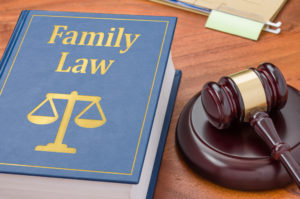The legal processes that follow a divorce or separation—from agreeing on how to divide assets to figuring out custody or financial support arrangements—can be exceptionally challenging and difficult to navigate, especially when children are involved. Getting help from a skilled, compassionate, and knowledgeable family lawyer who understands how the legal system works can greatly relieve these situations.

At Chadi and Company, we understand that changes to a family structure can be challenging. For more than 30 years, our experienced family lawyers have helped families in Edmonton and across Alberta navigate the complex legal processes that may arise from a divorce or separation. Our skilled lawyers carefully review each case and balance parties’ interests to make this life transition as smooth and cost-effective as possible for clients—supporting you and your family at every step.
Table of Contents
What are the most common family law court cases in Edmonton?
Family law is one of the most common branches of law and encompasses many scenarios, such as marriage dissolution, parenting agreements, and support payments. Every year, hundreds of thousands of family law cases are filed with civil courts across Canada, which accounts for nearly one-third of all civil court cases in the ten provinces and territories, including Alberta.
The most common family law court cases in Edmonton and across Alberta are:
- Divorces or separations: Divorces accounted for nearly half of family law cases in Canada in 2019/2020. In these cases, one or both spouses apply to the court to dissolve their marriage, which can raise questions such as how to divide up assets or whether to split or share custody of the children.
- Child custody or access: Custody issues refer to both living arrangements, where a child or children will primarily reside, and decision-making authority on health, education, or religion. The court may order that custody be granted to one or both parents. Matters relating to child access involve determining whether the non-custodial parent (the parent with whom the child or children does not primarily reside) may spend time with them, how often, and for how long.
- Child or spousal/partner support: Following a divorce or separation, one party may seek support from the other. Child support must be paid by the parent with whom the child or children does not primarily reside to ensure that they are financially supported by both parents. A spouse may also request support from the other spouse in cases where there is a large income difference, for instance.
These are the most common cases seen in Edmonton family law court because divorce or separation is very common. While most people enter a marriage with the view that the bond will last a lifetime, that is not always the case. Incompatibility, finances, infidelity, or abuse are some of the reasons contributing to the breakdown of a marriage.
If there are children involved, divorces or separations also mean settling issues such as custody, access, and support. In these cases, the children’s best interests are a top priority and are carefully considered.
Other common Edmonton family law cases include issues of parentage, non-parental guardianship matters, enforcement of court orders, estate matters, adoptions, and child protection.
Examples of notable family law cases
Below are two examples of notable cases that have been heard in a family law court.
Michel v. Graydon, 2020 SCC 24: Retroactive support after a child becomes an adult
- Background: The case involved two previously married parties that shared a child. After the divorce, they entered an agreement that included child support, but it was later found that the father had understated his income. As the child grew up, his income continued to rise and far exceeded the stated amount. The mother applied for retroactive child support when the child had turned 23 and was legally considered an adult.
- Decision: The court ordered that the father owed $23,000 in retroactive child support, which sent the message that unmet child support obligations cannot be dodged simply because the child has reached adulthood.
CAS v. NPC, 2020 ABQB 421: When is shared parenting appropriate?
- Background: In CAS v. NPC, the court outlined several factors that should be considered when determining the appropriateness of shared parenting.
- Decision: Factors that support shared parenting include whether both parties are capable and engaged parents, good communication between the parents, adequate work and child-care arrangements, a history of shared parenting, and whether the child or children prefer shared parenting. On the other hand, factors that signal against shared parenting include a lack of communication and cooperation between the parents in matters relating to the child, substantial conflicts, lack of a genuine willingness to work together, or evidence of one parent’s substance abuse.
These are just some examples of the questions that family law court weighs. Every case is different and has its own set of unique circumstances and facts.
Going to family court in Edmonton
All family law cases are filed with the Family Docket Court in Alberta’s Court of Queen’s Bench in Edmonton and Calgary. The Court helps you and your family assess what options may help best resolve issues, such as divorce, child or spousal support, or child custody arrangements.
Navigating your options and the potential legal proceedings in family court can feel overwhelming. With a trusted family lawyer by your side, you can ensure your family’s interests will be protected and prioritized.
Contact Our Family Law Lawyers at Chadi and Company Today
At Chadi and Company, we have decades of experience in helping families deal with custody and access, financial support, and other family law issues in Edmonton and across Alberta. If you have decided to separate or are struggling to collect spousal or child support, our skilled family law lawyers are devoted to achieving a fair outcome.
To learn more about our legal services and how we can help you, call us at (780) 429-2300 or contact us online to schedule a confidential consultation.






